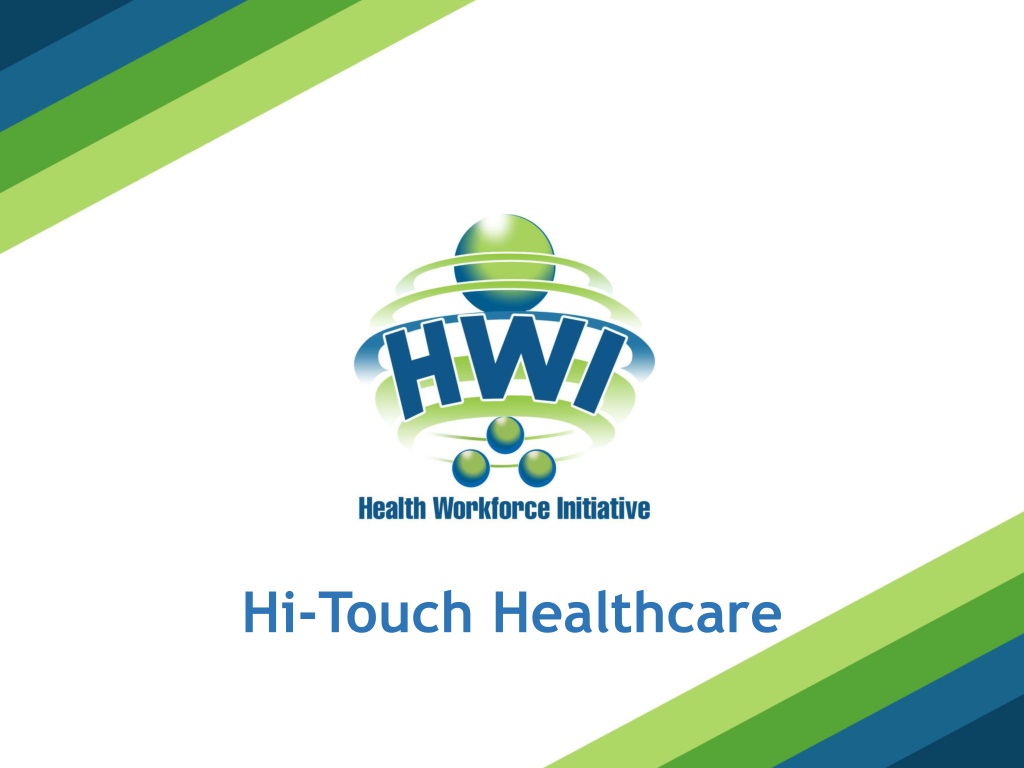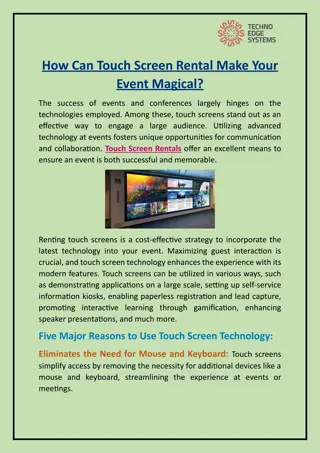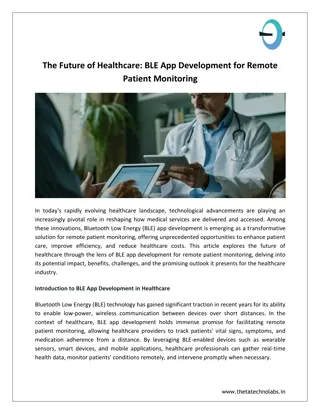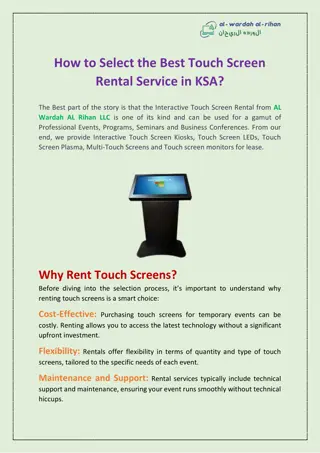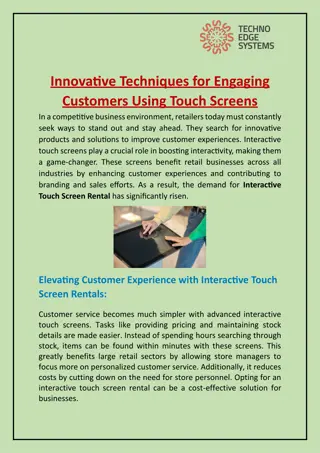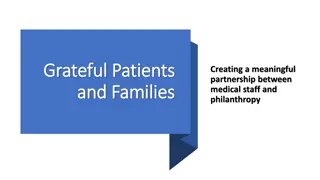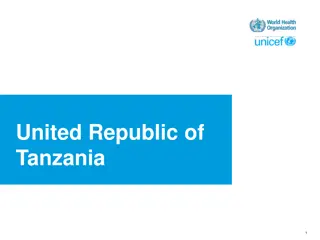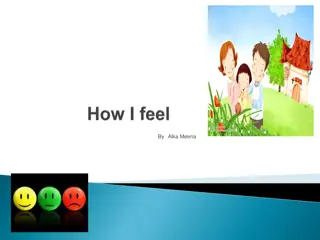Hi-Touch Healthcare
Highlighting the significance of cultural competence and communication skills in healthcare, this presentation explores topics like cultural sensitivity, the impact of communication on healthcare delivery, and the essence of cultural understanding. Delve into activities and discussions to enhance your understanding of different cultures and their influence on healthcare practices.
Download Presentation

Please find below an Image/Link to download the presentation.
The content on the website is provided AS IS for your information and personal use only. It may not be sold, licensed, or shared on other websites without obtaining consent from the author.If you encounter any issues during the download, it is possible that the publisher has removed the file from their server.
You are allowed to download the files provided on this website for personal or commercial use, subject to the condition that they are used lawfully. All files are the property of their respective owners.
The content on the website is provided AS IS for your information and personal use only. It may not be sold, licensed, or shared on other websites without obtaining consent from the author.
E N D
Presentation Transcript
CULTURAL PROFESSIONALISM AND COMPETENCY
WHAT TO EXPECT IN THIS PRESENTATION Overview of Cultural Competence Web of Culture Activity Importance of Cultural Competency What is Cultural Competency? Culture As Iceberg Activity Cultural Competency Requirements Interplay of Cultures Activity Cultural Sensitivity Practice Activity Touchpoints Activity
IMPORTANCE OF COMMUNICATION AND SOFT SKILLS Communication is the skill that can possibly have the greatest impact on effective healthcare delivery. It really is the key to clinical governance and demands as much attention, respect and sustaining as other seemingly harder targets. However, often the mere mention of the importance of communication causes less than positive reactions in healthcare professionals. (Jelphs, 2006, senior fellow at the Health Services Management Centre at the University of Birmingham)
The world in which you were born is just one model of reality. Other cultures are not failed attempts at being you; they are unique manifestations of the human spirit. Wade Davis
WHAT IS CULTURE? Unique behavioral patterns and lifestyles that differentiate one group from another A set of values, beliefs, worldviews, and attitudes that are transferred from generation to generation Manifested in daily life routines and activities Reflected in legends, drama, art, religion, and philosophies
WEB OF CULTURE ACTIVITY Write down the first two words that you associate with the words culture and healthcare Push yourself to use association to come up with four more words Again, using association, write down two more words Write down one final summary word after reviewing your list of words Adapted from SALTO, Intercultural Communication: Resource Pack.
WEB OF CULTURE Designate one member to be the record keeper Share your list of words and complete a collective copy of the Web of Culture worksheetwith the word(s) that you believe best describe culture and healthcare
WEB OF CULTURE Was it difficult to generate a list of words when working individually? Why or why not? Was it difficult to generate a list of words when working in a group? Why or why not? What word did your group choose as a summary word? What similarities and/or differences do you see? What is important to note about the similarities and/or differences? How does our perception of culture influence our patient care practices?
IMPORTANCE OF CULTURAL COMPETENCY United States is becoming more diverse White alone population was the only major race group to decrease in its proportion of total population (2010 U.S. Census Bureau). Lack of cultural sensitivity can lead to poor communication and misunderstandings. Negatively impacts health outcomes and patient safety Healthcare is seen as scientific but we must remember that our profession is deeply rooted in culture.
WHAT IS CULTURAL COMPETENCY? Cultural competence in health care describes the ability to: provide care to patients with diverse values, beliefs, and behaviors. tailor health care delivery to meet patients social, cultural, and linguistic needs. http://www.diversityconnection.org/diversityconnection/membership/ Resource%20Center%20Docs/Equity%20of%20Care%20Report%20FINAL.pdf
CULTURE AS ICEBERG ACTIVITY What cultural elements are visible (above the surface)? What cultural elements are invisible (below the surface)? Critical Incidents for Intercultural Communication. Retrieved from https://www.norquest.ca/NorquestCollege/media/pdf/centres/intercultural /CriticalIncidentsBooklet.pdf
CULTURAL COMPETENCY REQUIRES Understanding of the different cultural perspectives on Life processes Health and sickness Maintaining wellness Causes of illness Cure and care
INTERPLAY OF CULTURES ACTIVITY Patient Employee Setting Write down: Expected behaviors of a healthcare provider Expected behaviors of patients and families Expectations of the healthcare setting
CULTURAL SENSITIVITY PRACTICE ACTIVITY Read the Cultural Sensitivity Practice Table Discuss your observations/responses to the scenarios for 2 3 minutes Reflect on your daily interactions with patients Develop a list of 3 examples for how you can approach patients with more cultural sensitivity
http://staffingstream.wpengine.netdna-cdn.com/wp-content/uploads/2013/12/162707157.jpghttp://staffingstream.wpengine.netdna-cdn.com/wp-content/uploads/2013/12/162707157.jpg TOUCHPOINTS ACTIVITY You never get another chance to make a first impression. What are touchpoints? Everywhere that your organization touches customers and impacts their experience. What do patients see? What do patients hear? What do patients smell? What do patients touch? What do patients taste? Kinni, 2011
L.E.A.R.N. Listen to the patient s perception of the problem Explain your point of view Acknowledge and discuss the differences in perceptions of the problem Recommend treatment Negotiate treatment Martin, 2013
THANK YOU! Questions? Comments?
